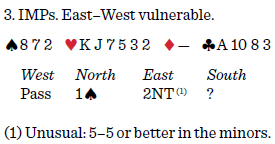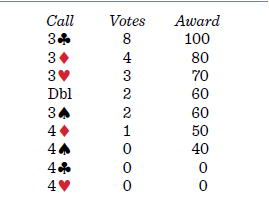
What’s your call?
| 3♣ | 3♦ | 3♥ | 3♠ | 3NT |
| 4♣ | 4♦ | 4♥ | 4♠ | 4NT |
| 5♣ | 5♦ | 5♥ | 5♠ | 5NT |
| 6♣ | 6♦ | 6♥ | 6♠ | 6NT |
| 7♣ | 7♦ | 7♥ | 7♠ | 7NT |
| Dbl | Pass |
Falk explains how it works. “Using unusual vs. unusual, 3♣ shows a forcing bid in the lower unbid suit. 3♥ would merely be competitive. I can raise spades later after first checking for the superior heart fit. I plan to force to game, even if we are doomed by bad breaks. The spades will, after all, be ‘on-side’ (depending, of course, on which ones we are missing).”
Rigal offers further details. “It is common practice to play unusual against unusual, using the 3♣ and 3♦ calls — one for hearts, one for spades. Thinking players (of whom there are depressingly few) know that the high cuebid should be spades since you don’t need the spare space on that auction while you do in the other sequence. Hence 3♣ — hearts — letting partner bid 3♦ so I can bid 3♠ is just right.”
Meyers first bids 3♣ — “invitational or better in hearts. And I will correct 3♥ to 3♠. Hopefully partner will get the message.”
The Coopers bid 3♣ to show “a forcing heart bid. If you had given us four spades, we would have splintered.”
Lawrence, too, uses 3♣ to show a forcing heart hand and adds, “The next round may be the real problem.”
Weinstein bids 3♣, “planning to compete to 4♠ if necessary. If our vulnerable vs. nonvulnerable opponents bid past 4♠ immediately, we want partner to judge whether to bid on based on his heart fit. If they don’t, then we are much better placed than if we started with a spade raise.”
Several panelists prefer to show the spade support immediately with 3♦ .
Sanborn is one. “I’m not sure what a limit raise is in Standard, but 3♦ feels right. There is a lot to show on this hand, but if I start by showing hearts, it will be tough to support spades later without overstating the hand.”
Stack describes how the South hand makes good use of the unusual vs. un-usual convention. He bids 3♥, showing “a hand similar to a weak two-bid, natural and constructive but nonforcing. We are ignoring the weak three-card spade support at this point.”
3♥ by Meckstroth. “I would prefer to find a heart fit, so I’m willing to risk 3♥ with the spade fit.”
The Joyces try 3♥. “We assume this bid is somewhat limited, and it shows where we live. We are willing to suppress the spade support with three low, since distribution figures to be unbalanced around the table.”
The Sutherlins double. “Slam in a major is definitely possible. We will have a better idea how to proceed when the auction comes back to us. There are many possibilities.”
Kennedy bids 3♠. “I don’t want to force to game. 3♥ would suggest a denial of spades.”
Cohen bids 3♠, too: “I’ll content my-self with supporting with support. The lack of a fourth trump (and likely bad splits) has me taking this conservative approach.”
Robinson makes a 4♦ splinter. “This sets spades as trump ASAP, which is important in constructive auctions. If I bid 3♥ or 3♣ (which shows hearts), partner will not know that we have a spade fit. If partner has good spades, he’ll cooperate.”


